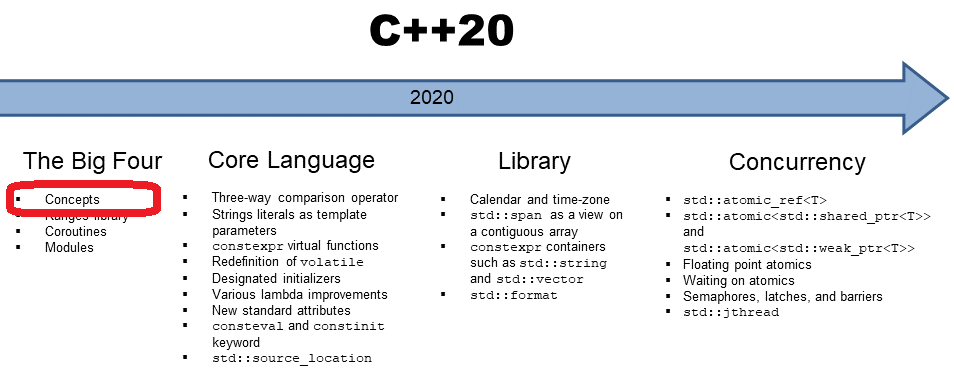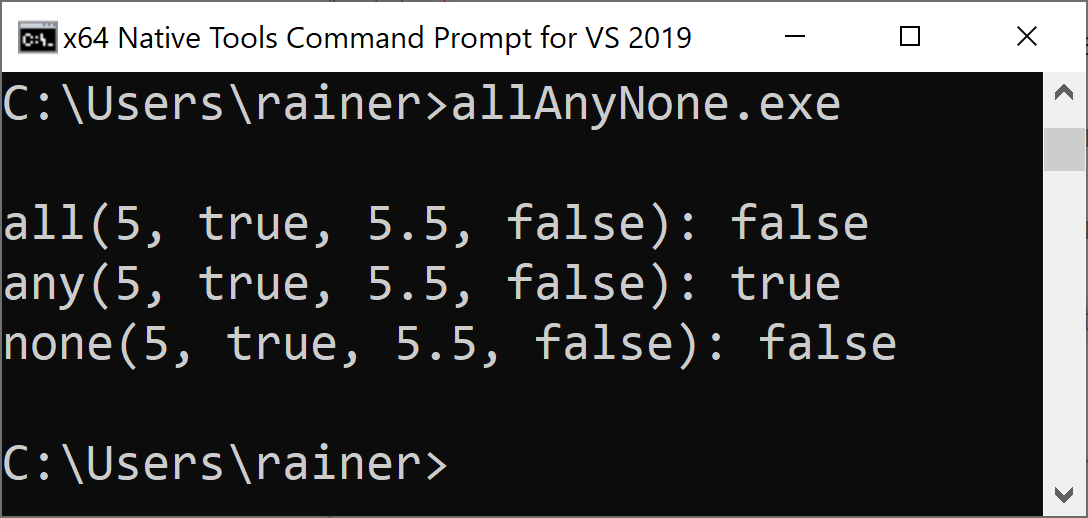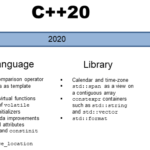C++20: Concepts, the Details
In my last post, C++20: Two Extremes and the Rescue with Concepts, I gave the first motivation for concepts. Concepts put semantic constraints on template parameters. Today, I present different use-cases for concepts in a compact form.

The Details
Just keep it in mind: What are the advantages of concepts?
- Requirements for templates are part of the interface.
- The overloading of functions or specialization of class templates can be based on concepts.
- We get an improved error message because the compiler compares the requirements of the template parameter with the actual template arguments
- You can use predefined concepts or define your own.
- The usage of auto and concepts is unified. Instead of auto, you can use a concept.
- If a function declaration uses a concept, it automatically becomes a function template. Writing function templates is, therefore, as easy as writing a function.
This post is about the first three points. Let me show many different usages of concepts:
Three Ways
There are three ways to use the concept Sortable. For simplicity reasons, I only show the declaration of the function template.
Requires Clause
template<typename Cont> requires Sortable<Cont> void sort(Cont& container);
Trailing Requires Clause
template<typename Cont> void sort(Cont& container) requires Sortable<Cont>;
Constrained Template Parameters
 Modernes C++ Mentoring
Modernes C++ Mentoring
Do you want to stay informed: Subscribe.
template<Sortable Cont> void sort(Cont& container)
The algorithm sort requires, in this case, that the container is sortable. Sortable has to be a constant expression and a predicate.
Classes
You can define a class template that only accepts objects.
template<Object T> class MyVector{}; MyVector<int> v1; // OK MyVector<int&> v2; // ERROR: int& does not satisfy the constraint Object
The compiler complains that a reference is not an object. Maybe you wonder what an object is.? A possible implementation of the type-traits function std::is_object answers:
template< class T> struct is_object : std::integral_constant<bool, std::is_scalar<T>::value || std::is_array<T>::value || std::is_union<T>::value || std::is_class<T>::value> {};
An object is either a scalar, an array, a union, or a class.
Member Functions
template<Object T> class MyVector{ ... void push_back(const T& e) requires Copyable<T>{} ... };
In this case, the member function requires the template parameter T to be copyable.
Variadic Templates
// allAnyNone.cpp
#include <iostream> #include <type_traits> template<typename T> concept Arithmetic = std::is_arithmetic<T>::value; template<Arithmetic... Args> bool all(Args... args) { return (... && args); } template<Arithmetic... Args> bool any(Args... args) { return (... || args); } template<Arithmetic... Args> bool none(Args... args) { return !(... || args); } int main(){ std::cout << std::boolalpha << std::endl; std::cout << "all(5, true, 5.5, false): " << all(5, true, 5.5, false) << std::endl; std::cout << "any(5, true, 5.5, false): " << any(5, true, 5.5, false) << std::endl; std::cout << "none(5, true, 5.5, false): " << none(5, true, 5.5, false) << std::endl; }
You can use concepts in variadic templates. The definition of the function templates is based on fold expressions. all, any, and none require from it type parameter T that has to support the concept Arithmetic. Arithmetic essential means that T is either integral or floating-point.
The brand-new Microsoft compiler 19.23 partially supports the concepts syntax.

More Requirements
Of course, you can use more than one requirement for the template parameters.
template <SequenceContainer S, EqualityComparable<value_type<S>> T> Iterator_type<S> find(S&& seq, const T& val){ ... }
The function template find requires that the container S is a SequenceContainer and its elements are EqualityComparable.
Overloading
std::advance(iter, n) puts its iterator iter n position further. Depending on the iterator, the implementation can use pointer arithmetic or go n times further. In the first case, the execution time is constant; in the second case, the execution time depends on the stepsize n. Thanks to concepts, you can overload std::advance on the iterator category.
template<InputIterator I> void advance(I& iter, int n){...} template<BidirectionalIterator I> void advance(I& iter, int n){...} template<RandomAccessIterator I> void advance(I& iter, int n){...} // usage std::vector<int> vec{1, 2, 3, 4, 5, 6, 7, 8, 9}; auto vecIt = vec.begin(); std::advance(vecIt, 5); // RandomAccessIterator std::list<int> lst{1, 2, 3, 4, 5, 6, 7, 8, 9}; auto lstIt = lst.begin(); std::advance(lstIt, 5); // BidirectionalIterator std::forward_list<int> forw{1, 2, 3, 4, 5, 6, 7, 8, 9}; auto forwIt = forw.begin(); std::advance(forwIt, 5); // InputIterator
Based on the iterator category, the containers std::vector, std::list, and std::forward_list support, the best fitting std::advance implementation is used.
Specializations
Concepts also support template specializations.
template<typename T> class MyVector{}; template<Object T> class MyVector{}; MyVector<int> v1; // Object T MyVector<int&> v2; // typename T
-
MyVector<int&> goes to the unconstrained template parameter.
-
MyVector<int> goes to the constrained template parameter.
What’s next?
My next post is about syntactical unification in C++20. With C++20, you can use a constrained placeholder (concept) in each place. You could use an unconstrained placeholder (auto) in C++11. But this is not the end of the unification. Defining a template becomes with C++20 a piece of cake. Just use a constrained or an unconstrained placeholder to declare a function.
Thanks a lot to my Patreon Supporters: Matt Braun, Roman Postanciuc, Tobias Zindl, G Prvulovic, Reinhold Dröge, Abernitzke, Frank Grimm, Sakib, Broeserl, António Pina, Sergey Agafyin, Андрей Бурмистров, Jake, GS, Lawton Shoemake, Jozo Leko, John Breland, Venkat Nandam, Jose Francisco, Douglas Tinkham, Kuchlong Kuchlong, Robert Blanch, Truels Wissneth, Mario Luoni, Friedrich Huber, lennonli, Pramod Tikare Muralidhara, Peter Ware, Daniel Hufschläger, Alessandro Pezzato, Bob Perry, Satish Vangipuram, Andi Ireland, Richard Ohnemus, Michael Dunsky, Leo Goodstadt, John Wiederhirn, Yacob Cohen-Arazi, Florian Tischler, Robin Furness, Michael Young, Holger Detering, Bernd Mühlhaus, Stephen Kelley, Kyle Dean, Tusar Palauri, Juan Dent, George Liao, Daniel Ceperley, Jon T Hess, Stephen Totten, Wolfgang Fütterer, Matthias Grün, Phillip Diekmann, Ben Atakora, Ann Shatoff, Rob North, Bhavith C Achar, Marco Parri Empoli, Philipp Lenk, Charles-Jianye Chen, Keith Jeffery,and Matt Godbolt.
Thanks, in particular, to Jon Hess, Lakshman, Christian Wittenhorst, Sherhy Pyton, Dendi Suhubdy, Sudhakar Belagurusamy, Richard Sargeant, Rusty Fleming, John Nebel, Mipko, Alicja Kaminska, Slavko Radman, and David Poole.
| My special thanks to Embarcadero |  |
| My special thanks to PVS-Studio |  |
| My special thanks to Tipi.build |  |
| My special thanks to Take Up Code |  |
| My special thanks to SHAVEDYAKS |  |
Modernes C++ GmbH
Modernes C++ Mentoring (English)
Rainer Grimm
Yalovastraße 20
72108 Rottenburg
Mail: schulung@ModernesCpp.de
Mentoring: www.ModernesCpp.org
Modernes C++ Mentoring,






Leave a Reply
Want to join the discussion?Feel free to contribute!